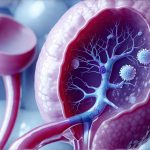Chronic inflammation is increasingly recognized as a silent contributor to many health issues beyond its traditionally understood roles in autoimmune diseases and injury response. It’s not simply about acute responses like a cut becoming red and swollen; rather, chronic inflammation represents a persistent, low-grade systemic activation of the immune system that can subtly undermine physiological processes over time. This ongoing inflammatory state is linked to various conditions including cardiovascular disease, type 2 diabetes, certain cancers, and increasingly, male reproductive health challenges. Understanding this connection is vital for proactive wellness strategies.
The modern lifestyle – characterized by poor diet, chronic stress, lack of sleep, and environmental toxin exposure – significantly fuels this persistent inflammation. The body’s natural anti-inflammatory mechanisms can become overwhelmed, leading to a state where the inflammatory response doesn’t resolve properly. This sustained activation impacts multiple systems and is now understood to play a significant role in conditions impacting male fertility and overall reproductive function.
Understanding Chronic Inflammation
Chronic inflammation differs markedly from acute inflammation, which serves as a vital component of healing. Acute inflammation is short-lived and targeted, resolving once the initial threat—an infection or injury—is addressed. In contrast, chronic inflammation persists even when there’s no apparent immediate trigger, creating a constant burden on the body’s resources and disrupting normal physiological functions. It involves a complex interplay between immune cells, cytokines (signaling molecules), and other inflammatory mediators.
The sources of chronic inflammation are diverse, ranging from autoimmune responses to ongoing infections and lifestyle factors as previously mentioned. Identifying and addressing these underlying causes is crucial for managing its impact on overall health, including reproductive wellbeing.
The Impact on Male Reproductive Health
Chronic systemic inflammation can profoundly affect multiple aspects of male reproductive function. It doesn’t directly attack the testes in most cases but creates an environment that compromises sperm quality, hormone production, and overall testicular health. This disruption can manifest as reduced fertility, erectile dysfunction, or other related concerns.
Sperm Quality & Function
One of the most significant impacts of chronic inflammation is on sperm parameters. Inflammatory cytokines can directly damage sperm cells, reducing their motility (ability to move), viability (percentage of live sperm), and morphology (shape). Oxidative stress, often accompanying chronic inflammation, further exacerbates this damage as it overwhelms the body’s antioxidant defenses. Even subtle decreases in these parameters can significantly reduce a man’s ability to father children. Inflammation can also disrupt spermatogenesis, the process by which sperm are created, leading to fewer overall sperm numbers.
Inflammation isn’t limited to affecting the mature sperm; it can impact their development even during earlier stages of production within the testes. This makes early identification and management of chronic inflammation crucial for preserving reproductive potential.
Hormonal Imbalance & Testosterone Production
Chronic inflammation interferes with the hypothalamic-pituitary-gonadal (HPG) axis, a critical hormonal feedback loop regulating testosterone production. Systemic inflammation can suppress the hypothalamus and pituitary gland’s ability to release hormones necessary for optimal testicular function. This disruption ultimately leads to lower testosterone levels which are vital not only for reproductive health but also muscle mass, energy levels, mood regulation, and overall wellbeing.
Low testosterone levels directly impact sperm production, libido, and erectile function, creating a vicious cycle where decreased hormonal balance further compromises reproductive capability. Furthermore, chronic inflammation can increase the conversion of testosterone to cortisol (the stress hormone), exacerbating hormonal imbalance.
Testicular Function & Oxidative Stress
The testes are particularly vulnerable to oxidative stress induced by chronic inflammation. While some level of reactive oxygen species (ROS) is necessary for normal sperm function, excessive ROS overwhelms the testicular antioxidant capacity, causing lipid peroxidation and DNA damage in sperm cells and Leydig cells (which produce testosterone). This leads to impaired spermatogenesis and reduced testosterone synthesis.
Inflammation also compromises the blood-testis barrier, a protective layer that shields developing sperm from harmful substances. A weakened barrier allows more inflammatory molecules and toxins to reach the testes, further escalating oxidative stress and damage. Addressing inflammation is therefore crucial for preserving testicular health and function.
Ultimately, understanding the intricate link between chronic inflammation and male reproductive health empowers individuals to adopt proactive strategies focused on lifestyle modifications and preventative care. This includes dietary changes emphasizing anti-inflammatory foods, regular exercise, stress management techniques, adequate sleep, and minimizing exposure to environmental toxins – all contributing to a healthier internal environment for optimal reproductive wellbeing.





















